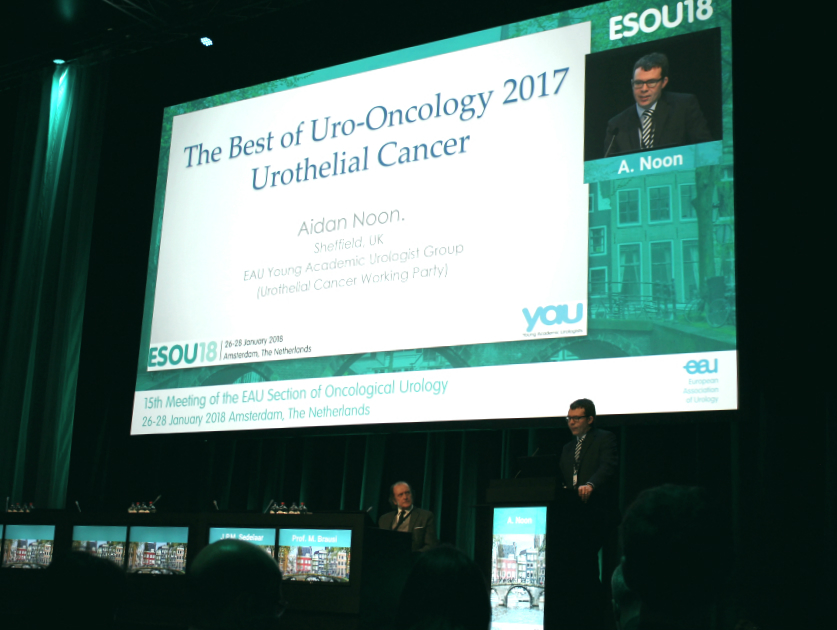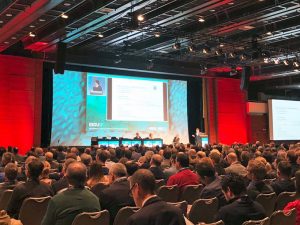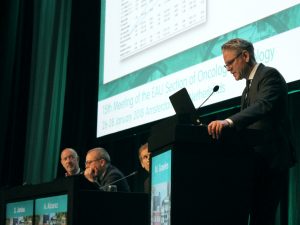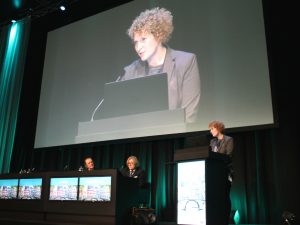Innovative research in prostate, renal, urothelial, testis and penile cancers of the previous year were collated and presented today during the session “The best of uro-oncology in 2017” chaired by ESOU18 Chairman, Prof. M. Brausi.
On prostate cancer
Prof. Giorgio Gandaglia (IT) cited the study of Radtke et al. for update regarding diagnosis. The study said novel risk models (RMs) incorporating clinical parameters and magnetic resonance imaging (MRI) assessment according to PI-RADS are superior to ERSPC-RCs and PI-RADS alone to discriminate between the presence and absence of sPC (second primary prostate cancer).
And in terms of local treatment, Prof. Gandaglia presented the summary from the research of Wilt et al. which stated that death from PCa was very uncommon among men with low-risk disease who were assigned to observation. Surgery may be associated with decreased mortality among men with intermediate-risk PCa.
With regard to recurrence after curative-intent treatment, research by Shipley et al. said that the addition of 24 months of daily bicalutamide to SRT (salvage radiation therapy) resulted in significantly higher rates of long-term OS and lower incidences of metastatic PCa and death from PCa than RT (radiation therapy) plus placebo; The benefit was greater among men with higher baseline PSA levels.
Prof. Gandaglia also presented the research by James et al. for update regarding systemic therapies. The research stated that men with locally advanced or metastatic prostate cancer who received androgen deprivation therapy (ADT) plus abiraterone and prednisolone had significantly higher rates of overall and failure-free survival than those who received ADT alone.
Additionally, based on the research by Fizazi et al., the addition of abiraterone acetate and prednisone to androgen-deprivation therapy significantly increased overall survival and radiographic progression-free survival in men with newly diagnosed, metastatic, castration-sensitive PCa.
On renal cancer
Prof. E. Linares Espiños (ES) stated that the tumuor bed recurrence is described in 1,5-2% after PNx (partial nephrectomy), showing no association with operative technique or ischemia type. Preoperative glomerular filtration rate (GFR) and GFR loss with surgery are the most important predictors of CKD (chronic kidney disease). However, GFR loss appears to have less impact on survival.
Prof. Linares Espiños said that there is increased interest in locally advanced disease but the oncologic benefit of LND (lymph node dissection) in high-risk RCC (renal cell carcinoma) remains unproven. She mentioned the controversial results in the adjuvant setting – the new data with Pazopanib shows no OS (overall survival) or DFS (disease-free survival) benefit. Additionally, Cabozantinib represents a potential new treatment option in 1st line mRCC for intermediate- and poor-risk mRCC (phase II trial).
On urothelial cancer
In his lecture, Prof. A. Noon (GB) cited a study by Moss et al that there is better molecular characterisation of UCC (urothelial carcinoma) patient groups, and that we currently have molecularly defined patient “subgroups”. He stated that new subgroups can be subject of RCTs (randomized clinical trials) of existing or novel targeted therapy. Prof. Noon heeds caution when using biomarkers.
On testis and penile cancer
Prof. M. Salagierski (PL) said that the miR-317a-3p appears a promising germ cell tumours (GCT) marker. He said that long-term toxicity should be minimised and adjuvant therapy should be restricted to high-risk GCT patients.
Prof. Salagierski mentioned that late relapses of GCT are rare and F-U should be risk-adapted. He added that organ sparing surgery provides comparable oncologic outcomes to conventional techniques in properly selected penile cancer patients.




